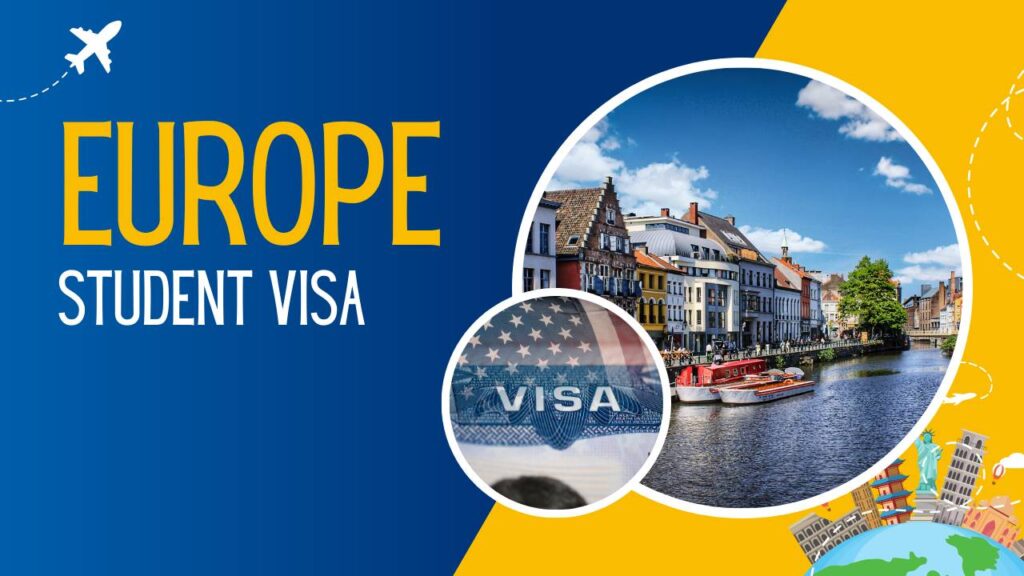As a student planning to study abroad in 2025, one of the most important steps in your journey is securing a Europe student visa. Europe remains a top destination for international students due to its high-quality education, diverse cultures, and relatively affordable tuition fees. Visa approvals can vary significantly from country to country, and understanding where the process is smoother can save you both time and stress.
Here, know the easiest countries in Europe where getting a student visa in 2025 is more straightforward, and what you need to know to improve your chances of approval. Targeting a top-tier university or a more affordable education option, knowing the visa process is just as important as selecting the right academic program.
Why Choose Europe for Higher Education in 2025?
Europe offers a wide variety of globally recognized universities, innovative academic programs, and multicultural environments that enrich the student experience. With over 4,000 higher education institutions across the continent, students have the opportunity to pursue nearly any field of study in multiple languages. The continent also offers various student exchange programs, scholarships, and Erasmus+ opportunities that reduce costs and open doors to diverse experiences.
Easy Visa Countries in Europe for Indians, Filipinos & Non-EU Citizens
Some countries even offer full-tuition scholarships to international students, significantly lowering financial barriers. The ability to travel freely within the Schengen Area enhances your academic journey by allowing you to attend conferences, internships, or simply visit neighboring countries.
What Makes a Country “Easy” for Student Visa Approval?
When we talk about the “easiest” countries for Europe student visa approval, we refer to countries with:
- High visa acceptance rates, especially for students with valid admission and financial proof.
- Clear, streamlined application processes that are easy to follow and supported by embassies or consulates.
- Less stringent financial requirements, making it accessible to students from a range of economic backgrounds.
- Fast processing times, ensuring students receive their visas well before the academic year begins.
- Fewer rejections for genuine students, which means less stress and a better success rate overall.
A country becomes visa-friendly when its system supports international education, and institutions actively help students navigate the visa process. Such countries also tend to have better post-study work opportunities, making them even more attractive.
Top European Countries with Easy Student Visa Processes in 2025
For international students planning to study in Europe in 2025, visa accessibility, affordability, and quality education are key considerations. The countries listed below not only offer streamlined student visa processes but also provide world-class education, affordable living, and solid post-study work options. Let’s know the top choices that are making it easier than ever for students to pursue their dreams abroad.
1. Germany – No Tuition Fees, High Visa Approval
Germany continues to rank among the top choices for international students, thanks to its tuition-free education at public universities and a growing list of English-taught bachelor’s and master’s programs. Prestigious cities such as Berlin, Munich, Frankfurt, and Hamburg are home to globally ranked universities like TU Munich, LMU, and Heidelberg University, attracting students in fields ranging from engineering and IT to business and social sciences.
Why Germany is easy for a student visa:
- The visa approval rate is around 92% for genuine applicants, especially those from India, Nigeria, and China, who meet academic and financial requirements.
- A transparent visa process is conducted through German embassies or VFS centers worldwide, with clear checklists and timelines provided online.
- Students must open a blocked account showing financial proof of €11,208/year, which helps demonstrate financial stability to the authorities.
- German universities provide official acceptance letters, which are critical to simplifying and strengthening the visa application.
Processing Time: 4–8 weeks
Post-Study Stay: 18-month job-seeker visa (extendable upon securing employment in a relevant field).
Germany also supports students with affordable public transport, subsidized healthcare, and low-cost student housing. You can work up to 20 hours per week during the semester, and full-time during vacations, helping offset living costs. This mix of affordability, opportunity, and career pathways makes Germany a smart choice.
2. France – Fast Process & Great for English Speakers
France is rapidly becoming a favorite for international students due to its efficient visa processing, international programs, and strong academic tradition in fields such as arts, business, design, and sciences. While French is the official language, over 1,500 English-taught programs are now available, particularly at the postgraduate level.
Why France is visa-friendly:
- The visa approval rate exceeds 90% for students who submit complete and accurate documentation.
- The France Visas portal streamlines the process, allowing for digital application, online appointment booking, and real-time status tracking.
- Students are required to show proof of around €7,380/year, which is significantly lower than in countries like the UK or Ireland.
- Long-stay student visas (VLS-TS) also act as residence permits, eliminating the need for separate paperwork post-arrival.
Processing Time: 2–4 weeks
Post-Study Stay: 12–24 months, depending on the level of study and field (particularly favorable for STEM and business students).
France also supports students with work rights up to 964 hours/year, generous housing subsidies (CAF), and access to high-quality public services. From Paris to Lyon and Toulouse, students enjoy a culturally rich lifestyle alongside excellent education.
3. Netherlands – Efficient, Digital, and English-Taught Programs
The Netherlands is one of the most accessible destinations for international students, with more than 2,000 English-taught courses and a tech-driven, student-focused visa process. Dutch institutions are globally known for their strengths in engineering, design, business, and environmental studies.
Why Netherlands is one of the easiest:
- Dutch universities often handle visa applications directly through the IND, easing the burden on students.
- The system is digitally managed, with minimal paperwork and swift approvals through online submission portals.
- Financial requirements are moderate, around €11,000/year, including tuition and living costs.
- Institutions like TU Delft, University of Amsterdam, and Erasmus University are top choices for international students.
Processing Time: 2–4 weeks (often initiated by the university)
Post-Study Stay: 1-year Orientation Year visa (Zoekjaar) for job hunting.
In cities like Amsterdam, Utrecht, and Eindhoven, students benefit from global corporate hubs, strong English proficiency, and a welcoming, multicultural society. Part-time work opportunities and scholarships for international students make the Netherlands even more attractive.
4. Sweden – Smooth Digital Process & High Acceptance
Sweden stands out as a hub of innovation, sustainability, and equality, offering a supportive education ecosystem and a straightforward student visa process. It’s an ideal destination for students interested in tech, environmental sciences, design, and humanities.
Why Sweden is considered easy:
- The residence permit application is fully online, allowing students to upload documents, track their application, and receive timely updates.
- Sweden has a high acceptance rate for international student visa applications, particularly for those with strong academic profiles.
- Universities actively assist in gathering documentation, including accommodation confirmations and health insurance.
- Students must show proof of about SEK 10,314/month for 10 months, equivalent to around €9,000/year.
Processing Time: 4–6 weeks
Post-Study Stay: Up to 12 months to seek employment, with options to convert to a work visa later.
Students in Sweden enjoy high-quality healthcare, a safe and inclusive society, and access to top-ranked universities such as Lund University, KTH Royal Institute of Technology, and Uppsala University. English is widely spoken, making integration much easier.
5. Ireland – Fast Processing, English Language, and Tech Jobs
Ireland remains one of the most visa-friendly and employment-driven destinations in Europe. With a strong reputation in tech, pharmaceuticals, finance, and healthcare, Ireland is particularly appealing for students seeking a direct pathway from study to employment.
Why Ireland is favorable:
- Ireland boasts a 95% visa approval rate for genuine applicants who meet academic and financial documentation standards.
- The process is very efficient, especially for Indian, Canadian, and EU students, with decisions often made within weeks.
- Students must show proof of €10,000/year to cover living expenses, and most universities provide pre-visa support.
- You receive a Stamp 2 visa, allowing part-time work (20 hours/week during term, full-time during holidays).
Processing Time: 2–3 weeks
Post-Study Stay: 1–2 years under the Stamp 1G Graduate Scheme, which is extendable based on employment.
With top universities like Trinity College Dublin and University College Dublin, Ireland offers a vibrant student culture, scholarships such as the Government of Ireland International Education Scholarship, and an easy transition to work in multinational companies headquartered in Dublin and Cork.
6. Spain – Low Financial Barriers and Easy Process
Spain is becoming an increasingly popular destination for students seeking a low-cost European education with a vibrant lifestyle. Though Spanish is the dominant language, an increasing number of institutions now offer English-medium programs in business, hospitality, and IT.
Why Spain is easy for visas:
- Student visas in Spain have a high approval rate, especially for students with confirmed university admission and sufficient financial support.
- Universities and private colleges often provide visa assistance, orientation programs, and guidance on the application process.
- The cost of living is lower than in many Western European countries, especially outside Madrid and Barcelona.
- The financial requirement is low, typically around €6,000/year, making it one of the most affordable in Europe.
Processing Time: 2–6 weeks
Post-Study Stay: Students can apply for a 1-year job-seeker visa and later transition to a work permit.
Spain also allows part-time work during studies and offers a rich cultural experience, warm weather, and an excellent quality of life. Cities like Valencia, Granada, and Malaga provide strong academic environments with lower living costs.
Tips to Boost Your Europe Student Visa Approval in 2025
1. Apply Early
Start your visa application at least 3–4 months before your course begins. Early applications help avoid last-minute delays and give you enough time to gather all required documents. Embassies often experience a surge in applications before major academic sessions, so early submission improves your chances.
2. Submit Clear Documentation
Make sure all your documents are complete, valid, and clearly legible. If your papers are in a foreign language, get them professionally translated. Ambiguous or incomplete documents are a common reason for visa delays or rejections, so double-check everything carefully before submission.
3. Customize Your Statement of Purpose (SOP)
Your SOP should clearly explain why you chose the specific country and course. Discuss your academic goals and how this program fits into your future career plans. A personalized and honest SOP shows your genuine intent to study and convinces visa officers of your seriousness.
4. Keep Details Consistent
Ensure names, dates, and addresses match exactly across all forms and documents. Even small inconsistencies can raise doubts and slow down the processing time. Consistency reflects professionalism and attention to detail, which embassies appreciate.
5. Prepare for the Interview
If your embassy requires an interview, practice common questions like your study plans, financial backing, and post-study goals. Being confident and clear in your answers demonstrates your preparedness and commitment to your studies.
6. Use University Support
Many universities offer international student support services that help with visa procedures. They can review your documents, provide invitation letters, and guide you on embassy-specific requirements. Leveraging their expertise can simplify your application process.
7. Show Strong Financial Proof
Present recent bank statements or sponsor letters proving you can cover tuition fees and living expenses. Financial stability is a key concern for visa officers, so providing clear and credible evidence is crucial.
8. Get the Right Health Insurance
Some countries require specific health insurance that covers your entire stay. Verify the insurance policy meets your host country’s standards and include the proof with your application to avoid unnecessary delays.
9. Prove Intent to Return
Some embassies want assurance that you plan to return to your home country after studies. Highlight family ties, job prospects, or business plans in your SOP or interview to strengthen your case.
10. Keep Copies of All Documents
Always keep both digital and physical copies of your application forms, receipts, passports, and correspondence. This helps in quick retrieval if you need to provide proof or follow up on your application.
All six countries in this list combine high visa approval rates, quality education, and robust support for international students. Start your application early, stay organized, and you’ll be well on your way to studying in Europe by 2025.
Europe Visa Fee & Cost 2025: Price, Charges, Processing Time
FAQs
1. What is a Europe student visa?
A Europe student visa is a legal permit that allows international students to enter and study in a European country for a specified period.
2. How long does it take to get a Europe student visa?
Processing times vary by country but typically range from 15 days to 3 months. It’s best to apply at least 3 months before your course starts.
3. Which documents are required for a Europe student visa?
Common documents include an acceptance letter from a university, valid passport, financial proof, health insurance, accommodation proof, and a completed visa application form.
4. Can I work while studying on a Europe student visa?
Many European countries allow part-time work (usually 10-20 hours per week) during the semester and full-time during holidays, but rules vary by country.
5. Do I need health insurance for a Europe student visa?
Yes, most European countries require valid health insurance covering the entire duration of your stay.
6. Can family members accompany me on my student visa?
In many countries, immediate family members (spouse, children) can apply for a dependent visa, but conditions and application processes differ.
7. Is it necessary to attend a visa interview?
Some countries require an interview, either in-person or online, while others may not. Check the embassy guidelines for your destination.
8. How much financial proof do I need to show?
You must demonstrate enough funds to cover tuition fees, living expenses, and other costs, which vary by country and program.
9. Can I extend my student visa in Europe?
Most countries allow visa extensions if you continue your studies or enroll in a higher-level program, but you must apply before the visa expires.
10. What happens if my student visa application is rejected?
You can usually appeal the decision or reapply after addressing the reasons for rejection. It’s important to carefully review and improve your application before reapplying.






